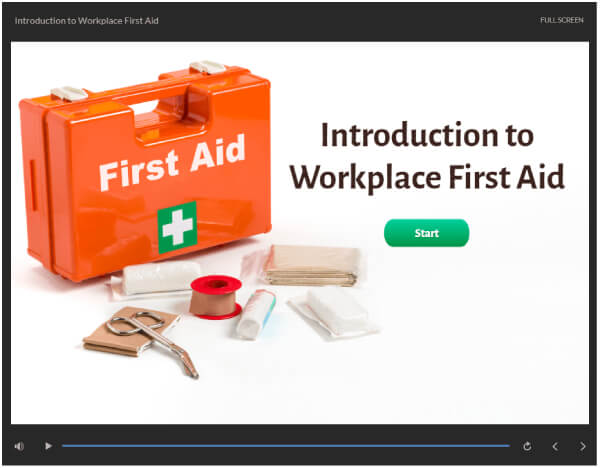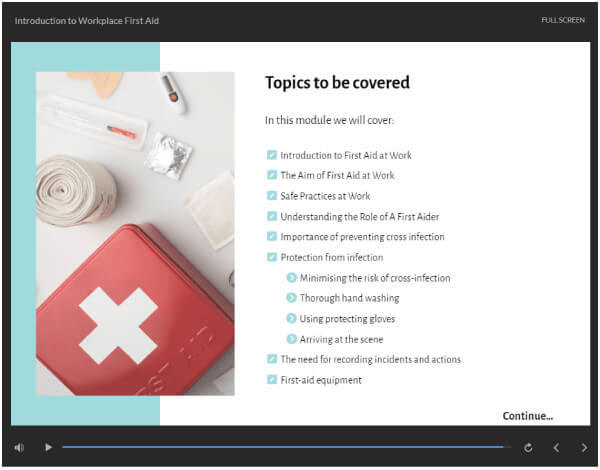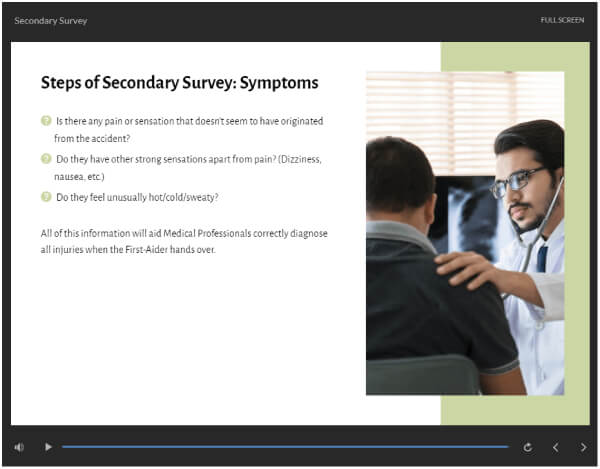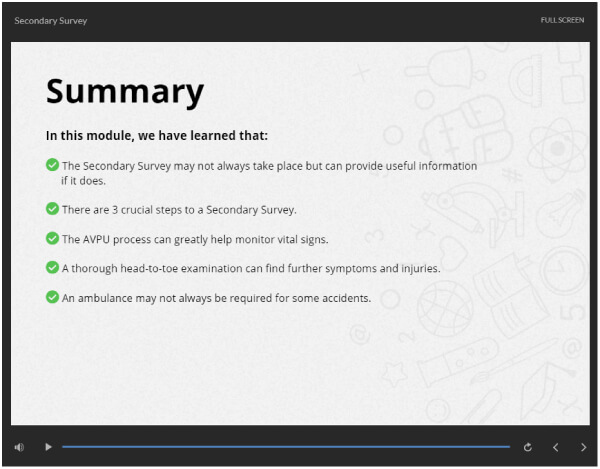GET THIS COURSE AND 2500+ OTHERS FOR ONLY £49 FIND OUT MORE
IN HIGH DEMAND!
The Emergency First Aid at Work (EFAW) Course is a comprehensive training program designed for individuals looking to gain or enhance their first aid skills in the workplace. This course is suitable for beginners as well as professionals seeking to refresh their existing skills and advance their knowledge of first aid procedures. It covers a wide range of workplace emergencies, safety laws and regulations, best practices, and the use of essential first aid equipment.
In this comprehensive Emergency First Aid at Work (EFAW) Training Course, you will gain crucial life-saving skills that will give you the confidence to stay calm and professional in the face of any type of emergency incident. Through step-by-step guidance, practical case studies and exercises, you will learn how to treat minor injuries, help someone who has fallen ill, and much more.
You will be guided through best practice procedures for treating burns and scalds, placing someone in the recovery position, performing CPR and treating a wide range of injuries. By the end of the Emergency First Aid at Work (EFAW) Online Course, you will know how to act in critical scenarios such as someone suffering a stroke or seizure, and will have the experience to be the first point of contact in the workplace, should such an emergency arise.
- Accredited, quality CPD training
- Free Certificate
- Instant e-certificate and hard copy dispatch by next working day
- Fully online, interactive course with audio voiceover
- Course material developed by qualified professionals
- Free Retake Exams
- Self-paced learning accessible via laptop, tablet and smartphone
- 24/7 Learning assistance and tutor support
- Discounts on bulk purchases
£26,600 Average Salary, Up to £37,500/yr for this skill according to top UK career sites.
Course Preview
Sneak Peek of The Emergency First Aid at Work Training Course
Who Should Take The Emergency First Aid at Work (EFAW) Course
This Emergency First Aid at Work (EFAW) Course applies to organisations whose first aid needs assessment has identified the need for a responsible person to have a workplace first aid qualification. It applies to, but is not limited to, the following:
- Teachers and Educators
- Office Administrators
- Retail Store Assistants
- Construction Site Workers
- Hospitality Staff (Waiters, Bar Staff)
- Event Managers
- Security Personnel
- Warehouse Operatives
- Delivery Drivers
- Fitness Trainers
- Hairdressers and Beauticians
- Volunteers in Community Projects
- Self-Employed Business Owners
Learning Outcomes
By the end of the Emergency First Aid at Work (EFAW) Course, learners will be able to:
- Identify the different types of injuries and accidents that commonly occur in the workplace.
- Correctly place someone in the recovery position and perform emergency CPR
- Treat burns and bleeding, dress wounds and carry out a back blow in the case of choking
- Understand the fundamental role and responsibilities of the first aider
- Effectively monitor a casualty and correctly record and report accidents and injuries
- Help someone who is unresponsive and breathing, or unresponsive and not breathing
Certification
Once you’ve successfully completed your Emergency First Aid at Work (EFAW) Online Course, you will immediately be sent a digital certificate. Also, you can have your printed certificate delivered by post (shipping cost £5.99). All of our courses are fully accredited, providing you with up-to-date skills and knowledge and helping you to become more competent and effective in your chosen field. Our certifications have no expiry dates, although we do recommend that you renew them every 12 months.

Accreditation
All of our courses, including this Emergency First Aid at Work (EFAW) Online Course is fully accredited, providing you with up-to-date skills and knowledge and helping you to become more competent and effective in your chosen field.
Course Curriculum
Module One introduces the basic principles of First Aid in the workplace and the important responsibilities that a First-Aider must own. It also looks at the requirements of a good First Aid kit and the importance of preventing cross-infection. It also provides a pointer towards initial actions to take when an emergency is encountered.
In Module Two, we explain the legal duties of an employer (and employee) has in regards to providing First Aid equipment and facilities. It also covers the UK legislation that is currently in place, to ensure that the appropriate workers are trained in First Aid skills, along with further health and safety directives. The importance of accident reporting is examined as well.
In Module Three, we look at the way in which First Aid personnel should take charge during incidents and guide events. This naturally leads to the recommended actions to take during an emergency, where they will be influential in conducting safety during accidents involving fire, electricity, and water. This module also emphasises the need for self-safety as a First-Aider.
In Module Four, we look at the importance of a Primary Survey during an incident. It emphasises the importance of recording and understanding all the information that can be taken from the casualty and the incident. The module also instructs the way a Recovery Position can be applied to a patient.
Module Five explains the purpose of a Secondary Survey and why it may not always be necessary. It covers the benefits of a more protracted examination and detailed investigation into an incident. We explain the procedural steps of the survey and just how much it can influence the treatment of the casualty.
Module Six comprehensively describes the most commonly used First Aid techniques. We cover the “Chain of Survival”, and the key recommendations in an emergency. The components of a First Aid kit are also explored, with descriptions of how to apply dressings, bandages, and slings. The life-extending procedures involving CPR and AEDs are highlighted as well.
Module Seven describes the majority of minor injuries that a First-Aider can expect to encounter. It looks at the wide variety of common ailments and wounds that can occur easily, and how best to deal with them. The module also highlights the injuries that can escalate in severity and what to do to ensure the safety of the casualty.
Module Eight starts to cover the Secondary Illnesses that a First-Aider can come across. This module specifically explains the actions required when an adult, child, or baby becomes unconscious. It also goes into detail on how to check for breathing problems and apply resuscitation techniques.
Module Nine continues the theme of treating Secondary illness in a casualty. This module covers the conditions that can cause severe breathing difficulties in an individual, how they should be appropriately treated, and when emergency services should become involved.
Module Ten continues to look at Secondary Injuries that arise from long-time medical conditions or injuries. This covers a range of issues from complications caused by excessive bleeding, to the effects of Epilepsy, and the causes of Heart Attacks. The module also covers the different types of diabetes, and what causes the body to go into shock.
Module Eleven comprehensibly covers the different types of fractures and dislocations. It looks at the different ways bones can break or splinter, along with the appropriate treatment a First-Aider can perform. We also cover the risks behind head injuries and how bone displacement should be handled.
Module Twelve covers and summarises the different types of emergency services that are available in the UK. This final module will affirm the responsibilities of a First-Aider and instructs the learner on how and when to call the appropriate services.
Frequently Asked Questions (FAQs) on Emergency First Aid at Work (EFAW)
What is the Emergency First Aid at Work (EFAW) course?
The EFAW course is a comprehensive training program designed to equip individuals with the knowledge and skills required to handle workplace emergencies effectively. It covers essential first aid procedures, legal requirements, and techniques for managing incidents involving injuries and illnesses.
Do I need prior experience to enrol in this course?
No, the course is designed for beginners as well as individuals looking to refresh their existing first aid skills.
What is the difference between Emergency First Aid and Standard First Aid?
The main difference is the scope of training:
- Emergency First Aid at Work (EFAW): Focuses on handling immediate, life-threatening situations such as CPR, choking, and severe bleeding in a workplace setting.
- Standard First Aid: Includes a broader range of topics, covering additional injuries and illnesses, and is typically more suitable for high-risk environments.
How do I access the course?
The course is delivered online and can be accessed from any device with an internet connection, offering maximum flexibility.
Why is first aid important in the workplace?
First aid ensures immediate response to injuries or illnesses, reducing the severity of incidents and potentially saving lives before professional medical help arrives.
Course Curriculum
| Emergency First Aid at Work | |||
| Introduction to Workplace First Aid | 00:38:00 | ||
| Legal Framework for Workplace First Aid | 00:18:00 | ||
| Incident Management at Work | 00:31:00 | ||
| Primary Survey | 00:15:00 | ||
| Secondary Survey | 00:15:00 | ||
| Basic First-Aid Techniques | 00:35:00 | ||
| Dealing with Minor Injuries at Workplace | 00:25:00 | ||
| Secondary Illness: Loss of Responsiveness and CPR | 00:12:00 | ||
| Secondary Illness: Breathing Problems | 00:15:00 | ||
| Secondary Illnesses and Injuries | 00:15:00 | ||
| Dealing With Fractures and Dislocations | 00:21:00 | ||
| Call for an Emergency | 00:13:00 | ||

SAVE 50% - OFFER ENDS SOON
£50.00Original price was: £50.00.£25.00Current price is: £25.00. ex Vat- 1 year
- Level 3
- Course Certificate
- 4 hours, 13 minutes Gift this course
Buying more than one of the same courses?
- 50% discount for orders of 10+ courses
- 60% discount for orders of 50+ courses
- 70% discount for orders of 100+ courses
 Food Hygiene
Food Hygiene Health & Safety
Health & Safety Safeguarding
Safeguarding First Aid
First Aid Business Skills
Business Skills Personal Development
Personal Development





